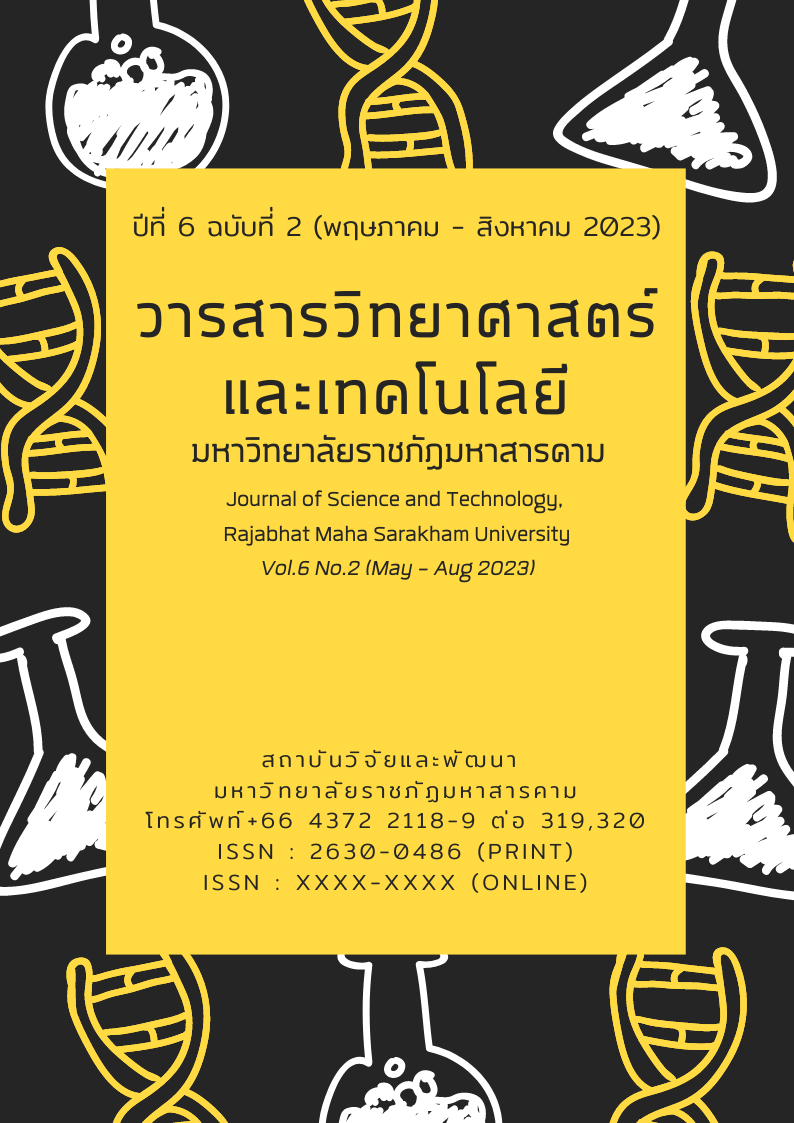Factors influencing seafood consumption behavior among Thai aged 18-60 years old in Bangkok
Keywords:
seafood, perception, consumptionAbstract
Seafood is a food that is beneficial to the body because it is rich in a variety of nutrients and benefits that the body needs, such as protein, vitamins and minerals, omega-3 fatty acids and also has anti-inflammatory properties. It also helps improve brain function and strengthens the immune system. However, contamination, chemicals, microorganisms and heavy metals have been detected in seafoods, eating unsafe seafood can have negative health effects. This study aimed to study of perception of seafood consumption, study of attitude towards seafood consumption, study of seafood consumption behavior and to find factors affecting the consumption behavior of safe seafood.
The objective of this study is to study perception, attitude and seafoods consumption behaviors and to study factors affecting seafood consumption behaviors. This is a predictive research that study people aged 18-60 years old in Bangkok. There were 402 people participated. Convenient Sampling Methods was used. An online survey (Google form) which its’ IOC equal to 0.91 and 1.0 was used to collect data during January – February 2023. Descriptive statistics such as frequency, percentage, mean and standard deviation and Inferential statistic such as multiple regression analysis were used to analyze data.
Most of the respondents had a moderate level of perception of safe seafood consumption (n=170, 42.29%). Most of the respondents had a moderate level of attitude towards the consumption of good seafood (n=376, 93.53%), and their seafood consumption behavior is at a good level (n=352, 87.56%). Attitude towards seafood consumption (Beta = .493, p-value < .01), awareness about seafood safety (Beta = .094, p-value < .01), age (Beta = .096, p-value < .01) were the predictors of seafoods consumption behavior, statistically significant.
References
Abd Rahim, M.H., and Ibrahim, M.I. (2022). Hand hygiene knowledge, perception, and self-reported performance among nurses in Kelantan, Malaysia: a cross-sectional study. BMC Nursing, 21(38).
Aquaculture Industry Technology Research and Development Division. (2019). Report on monitoring of formalin contamination in fresh aquatic animals. (Research Report). Bangkok: Aquaculture Industry Technology Research and Development Division
Baptista, R.C., Rodrigues, H., Sant'Ana, A.S. (2020). Consumption, knowledge, and food safety practices of Brazilian seafood consumers. Food Research International, 132(109084), (1-12).
Buasriyod, W., Namwong, N., Ruangsri, S., Kanyala, K., Suwannurak, N., Phaworn, L., Thani, M., On-Ong-Arj, P., & Chansathien, O. (2020). Detection of Formalin in Seafood’s Soaking at a Market in Nakhon Ratchasima Province. in Nakhon Ratchasima College. Meeting Minutes Report The 7th National Conference Nakhonratchasima College (page 1016 – 1023). Nakhon Ratchasima: Nakhon Ratchasima College.
Butt, A.A., Aldridge, K.E., & Sanders, C.V. (2004). Infections related to the ingestion of seafood. Part II: parasitic infections and food safety. The Lancet Infectious Diseases, 4(5), (294-300).
Faipet, T. (2020). Detection of Formalin in Seafood from the Market inU Thong District, Suphan Buri Province, Thailand. Journal of Council of Community Public Health, 2(2), (26-36).
Hazeena, S. H., Chen, X. H., Yeh, C. S., Hsieh, C. W., Chen, M. H., Huang P. H., Hou, C. Y., & Shih, M. K. (2023). The relationship among knowledge, attitude, and behavior of workers on food safety in Taiwan’s Company A. The Journal of Food Science and Technology, 60(3), (1294-1302).
Iddhibongsa, R., & Kleechaya, W. (2014). The contamination of heavy metals in fishes from landing places (Research Report). Bangkok: Fishery techmologocal development division, Derartment of fisheries.
Jaikanlaya, C., Settachan, D., Denison, M. S., Ruchirawat, M., & van den Berg, M. (2009). PCBs contamination in seafood species at the Eastern Coast of Thailand. Chemosphere, 76(2), (239-249).
Kaus, A., Schäffer, M., Karthe, D., Büttner, O., von Tümpling, W., Borchardt, D. (2017). Regional patterns of heavy metal exposure and contamination in the fish fauna of the Kharaa River basin (Mongolia). Regional Environmental Change, 17, (2023–2037).
Konkayan, S. (2016). Consumer’s Behavior on Seafood Consumption in Trang and Kantang Municipality, Trang Province. (The Degree of Master of Business Administration). Songkla: Prince of Songkla University.
Nanasombat, S., Potiraj, N., Sanma, P., Hapermpool W., & Sirisornchai, S. (2556). Detection of the Contamination of Vibrio parahaemolyticus from Raw Seafood Sold in Some Bangkok Freshfood Market and Thermal Inactivation Study. Thaksin University Journal, 16(3), (175-184).
Osaili, T.M., Al-Nabulsi, A.A., & Taybeh, A.O. (2021). Food Safety Knowledge, Attitudes, and Practices Among Jordan Universities Students During the COVID-19 Pandemic. Frontiers in Public Health, 9.
Phanwattana, P. (2019). Food consumption behavior of working age people in Bangkok. Journal of the Office of DPC 7 Khon Kaen, 26(2), (93-103).
Poolpol, K. (2018). Antibiotic resistance of Vibrio parahaemolyticus and Vibrio vulnificus Isolated from Seawater in Bang Sean Beach Area, Chonburi Province (research report). Chonburi: Burapha University
Sayuti, Y.A., Albattat, A., Ariffin, A. Z., Nazrin N. S., & Silahudeen T. N. A. T. (2020). Food safety knowledge, attitude and practices among management and science university students, Shah Alam. Management Science Letters, 10(4), (929-936).
Sornprasit, S., Kanchanarat, K., Assava-aree, A. (2017). Risk Assessment of Heavy Metals in Fish and Shrimp from Songkhla Lake to Thais. Bulletin of the Department of Medical Sciences, 59(2), (115-127).
Srisa-ard, B. (1992). Basic research. 5th ed., Bangkok: Suweeriyasan.
Sriwiboon, R., & Thitirakpanich, U. (2008). Detection of antibiotic residues in seafood and seafood products. Retrieved from: http://dspace.lib.buu.ac.th/xmlui/handle/1234567890/387
Thongra-ar, W., Musika, C., Wongsudawan, W., & Munhapon, A. (2014). Health Risk Assessment of Heavy Metals via Consumption of Seafood from Coastal Area of Map Ta Phut Industrial Estate, Rayong Province. Burapha Science Journal, 19(2), (39-54).
Wang J, Chen L, Yu M, & He J. (2020). Impact of knowledge, attitude, and practice (KAP)-based rehabilitation education on the KAP of patients with intervertebral disc herniation. Annals of Palliative Medicine, 9(2): (388-393).
Wiriyaakaradecha, S., Chuchird, N., Baoprasertkul, P., Somridhivej, B., Pichitkul, B., Keetanon, A., & Thamlikitkul, V. (2020). Study on contamination of antimicrobial resistance in culture of pacific white shrimp (Litopenaeus vannamei) in Thailand. Khon Kaen Agriculture Journal, 48(5), (1124-1133).
Zibangkerd, P., Tanpichai, P., & Yingyuad, N. (2021). Factors related to safety food consumption behavior of undergraduate student in kasetsart university, kamphaeng saen campus. Journal for social sciences research, 12(1), (170-191).



